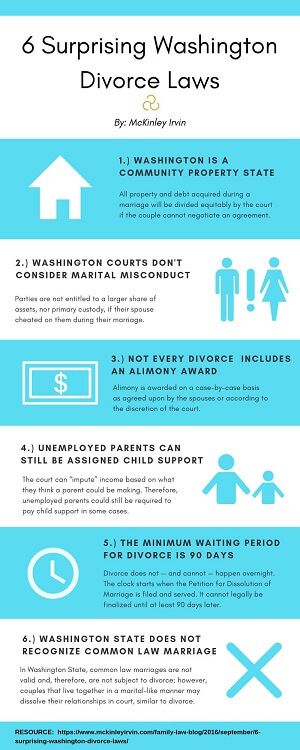Seeking a divorce in Washington? If you’ve never filed for divorce before, you are likely unfamiliar with the many facets of Washington divorce law. You may have several common expectations:
- “I want to get this over quickly.”
- “I will have to pay alimony.”
- “I will get preference in court because my spouse cheated on me.”
- “I will not have to pay child support because I don’t make enough money.”
You may be surprised to find out that the reality is quite a bit different. Here are six Washington divorce laws that you should be aware of:
1. Washington Is a “Community Property” State

This means that all property and debt acquired during a marriage will be divided equitably by the court if the couple cannot negotiate an agreement. Property that is subject to division includes money, the marital home, retirement funds, business interests, tax credits and refunds, investments, insurance policies, household furnishings, art and other valuables, credit cards, patents/copyrights, and deferred compensation. If it was acquired during the marriage, chances are it will be counted as marital property.
2. Washington Courts Do Not Consider Marital Misconduct
Many people mistakenly believe that they will be entitled to a larger share of assets or primary custody of their children in a divorce if their spouse cheated on them during their marriage. This is not the case. The courts do not consider marital misconduct as a deciding factor in the division of property, and infidelity is not usually an issue in deciding child custody.
3. Not Every Divorce Case Includes an Alimony Award
Alimony awards are determined on a case-by-case basis as agreed upon by the spouses or according to the discretion of the court. The courts take several factors into account when determining whether alimony is appropriate, including the length of the marriage, the income and earning capacity of each spouse, the age and health of each spouse, and more.
4. The Court Can Assign Child Support to an Unemployed Parent in Some Cases
When it comes to child support, did you know that if you don’t currently have a job, or are voluntarily underemployed, the court can “impute” income based on what they think you could be making? If the court finds that a parent is purposely unemployed/underemployed in order to reduce their child support obligation, imputing income ensures that the parent is still held responsible for providing for their children financially.
5. The Minimum Waiting Period for a Divorce is 90 Days
Divorces don’t happen overnight. In Washington, the minimum length of a divorce case is three months. The clock begins when the Petition for Dissolution of Marriage is filed and served to the non-filing spouse. It is common for divorce in Washington to take up to 6 months or longer.
6. Washington State Does Not Recognize Common Law Marriages
In order to file for a dissolution of marriage, a couple must have a valid legal marriage. Common law marriages are not seen as valid marriages and are therefore not subject to divorce. However, Washington does recognize committed intimate relationships, where a couple lives together in a marital-like manner, which can be dissolved in court similar to a marriage.
Washington divorce law can be complex, which is why it is in your best interest to consult with a knowledgeable attorney who can guide you through the divorce process. McKinley Irvin’s attorneys are experienced and knowledgeable in all facets of family law. We invite you to contact our firm to schedule a case evaluation with an attorney well qualified to handle your unique situation.